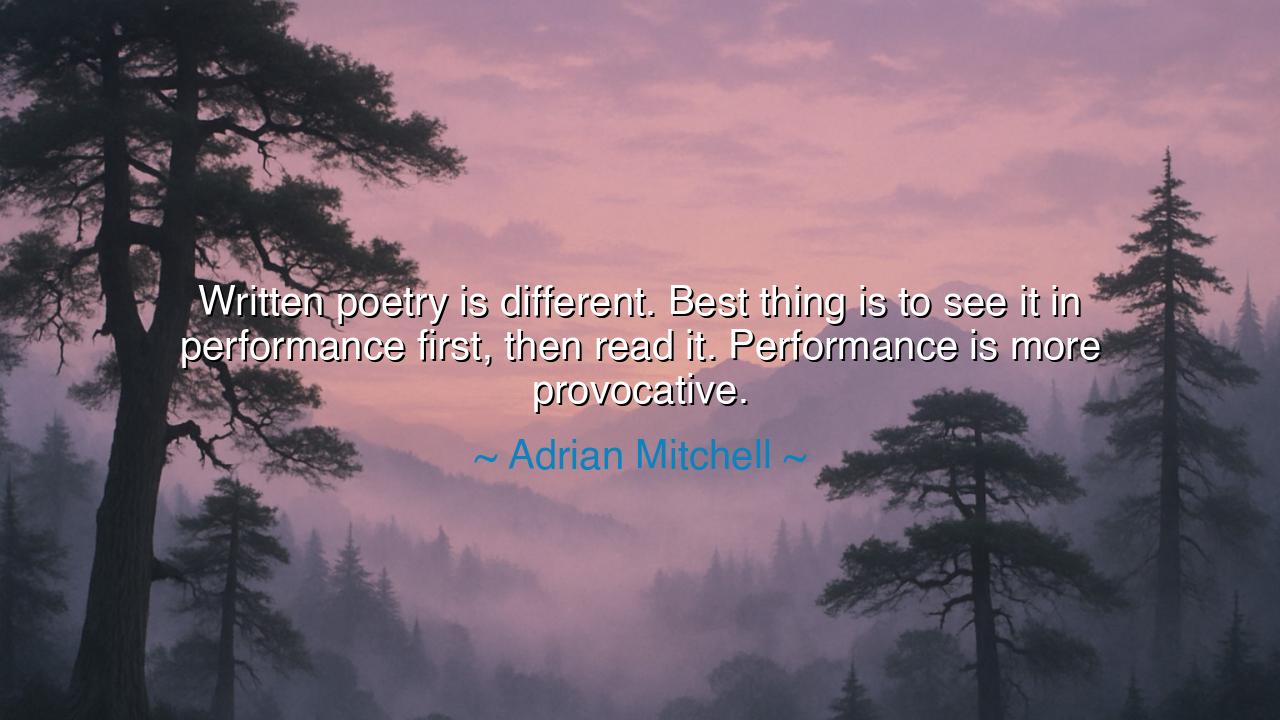
Written poetry is different. Best thing is to see it in
Written poetry is different. Best thing is to see it in performance first, then read it. Performance is more provocative.






Hear the voice of Adrian Mitchell, poet of fire and conscience, who declared: “Written poetry is different. Best thing is to see it in performance first, then read it. Performance is more provocative.” In these words he reminds us that poetry is not born in silence but in breath, not made to be caged on the page but to thunder forth from the living voice. Written poetry is a shadow of its greater form—the living song, the spoken cry, the embodied rhythm that shakes the air. To witness it alive is to feel its flame; to read it afterward is to hold the glowing ember in your hand.
The ancients knew this truth well. The rhapsodes of Greece carried the verses of Homer upon their tongues, not their scrolls. They chanted in marketplaces and feasting halls, so that the people might hear the clash of bronze and the sorrow of parting as if they stood upon the plains of Troy themselves. The performance was the soul; the written word, a vessel that preserved but could not equal the living sound. For words are born of breath, and breath is spirit, and spirit cannot be confined to ink alone.
Think of how the world’s revolutions have often been stirred not by silent reading but by voices crying out. In the American struggle for freedom, it was not merely the words of Thomas Paine’s Common Sense on the page, but the fiery speeches in taverns and assemblies that roused the people. In the Civil Rights Movement, Martin Luther King Jr.’s “I Have a Dream” is remembered not as lines of print but as thunder rolling over the steps of the Lincoln Memorial. Here we see Mitchell’s wisdom: performance pierces deeper, awakens quicker, provokes more fiercely than the written page.
There is a tale from Ireland that illustrates this power. When W. B. Yeats recited his poem “Easter, 1916,” it was not simply verse but prophecy. His voice carried the grief and fire of a nation awakening to sacrifice, and those who heard it were stirred as no printed pamphlet could stir them. The poem in print was powerful, yes, but the living utterance moved the blood like a trumpet call. Such is the nature of poetry in performance—it is not simply read, it is felt.
Mitchell’s cry, then, is also a rebuke to us who dwell in silence and screens, who let the living fire of language cool into mere text. He reminds us that poetry must be embodied, spoken, breathed into being. It is a communal act, for in hearing together we are bound by rhythm, voice, and silence shared. Reading in solitude is noble; but listening in fellowship is transformative. When poetry is performed, it ceases to be a private jewel and becomes a blazing torch held high.
The lesson for us is clear: do not let poetry remain dead on the page. Seek it in the voice of the poet, in the mouths of actors, in the gatherings where verse is shouted, sung, and whispered. And when you yourself hold a poem, speak it aloud, even to the empty room, for in your voice it takes on the breath of life. Do not be ashamed to give it sound, for poetry was meant to echo in the heart, not lie silent in the eye.
Practical steps are within reach. Attend poetry readings; gather friends and read aloud to one another; listen to recordings of poets past and present, for their voices are still rivers carrying meaning. And when you write, remember to speak—test your words against the air, let them strike your ear before they strike another’s eyes. In this way you join the long chain of humanity, who from the dawn of time have sung their truths around fire, field, and forum.
Thus Adrian Mitchell has spoken truly: performance is the sharper blade, the greater fire. But let us not discard the written page; let it remain as the enduring ember. First the flame in the voice, then the ember in the hand—that is the rhythm of poetry, ancient and eternal.






NMNgo Mai
I find this idea refreshing because it restores poetry to the body. Reading poetry can feel cerebral, but performance activates emotion and presence. It makes me think about how the same poem can be powerful or flat depending on how it’s delivered. Still, I wonder if relying on performance risks overshadowing the words themselves. Should poetry stand on its own without the performance to carry it?
VHVy Huynh
Mitchell’s point challenges how we consume poetry today. In classrooms, we often analyze poems as text, dissecting metaphors and structure, but rarely feel them. Hearing a poet perform their own work can completely shift your understanding—it brings personality and urgency. Does that mean we’ve been engaging with poetry incorrectly for generations? Or is written poetry simply a different, more reflective experience altogether?
HNHuyen Ngoc
I totally agree with the idea that performance adds another layer to poetry. When you hear a poem performed, it’s not just about the words—it’s about energy, pacing, and even silence. Reading alone feels more introspective, but performance hits the senses. I wonder if some poems are even meant to be read quietly at all. Maybe we should treat poetry like music—experienced first through sound, then studied through text.
ATPham Bach Anh Tram
This makes me think about how poetry has evolved from an oral tradition into something mostly experienced on the page. Maybe Mitchell is right—something essential gets lost when poetry is confined to text. The rhythm, tone, and emotion of a live voice can change the meaning entirely. Do you think performance poetry reconnects us with poetry’s original roots, or does it create a new, more theatrical art form?